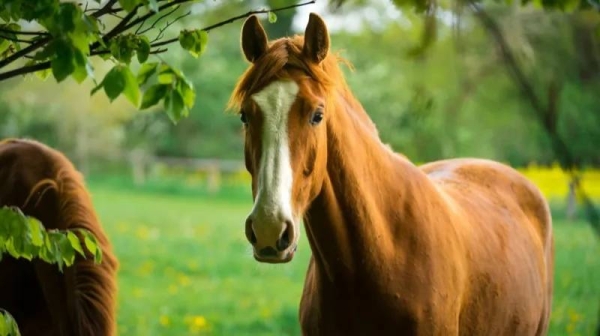A recent study conducted by researchers at Nottingham Trent University (NTU) has found that horses are more intelligent than previously believed. The study involved 20 horses who were trained to play a treat-based game with changing rules. The researchers were surprised by how quickly the horses adapted to the changing rules, debunking the theory that horses only respond to immediate stimuli and are not capable of strategizing. The findings of this study could lead to more humane training methods for horses and improve their overall welfare.
In the first stage of the study, the horses were rewarded with a treat for touching a piece of card with their nose. In the second stage, a “stop light” was introduced, and the rule was changed so that the reward was only given if they touched the card while the light was off. Despite the change in rules, the behavior of the horses did not alter, as they continued to touch the card regardless of the status of the light. However, this changed in the third stage when a penalty of a 10-second timeout was introduced for touching the card while the stop light was on. The horses quickly adjusted their behavior to avoid the timeout, demonstrating their ability to learn and adapt to new rules.
Lead researcher Louise Evans was surprised by how immediate and significant the improvement in the horses’ performance was after the introduction of the timeout. The rapid adjustment to the new rules suggests that the horses understood the rule of the stop light all along but had no reason to follow it when there was no consequence for getting it wrong. The study, published in the Applied Animal Behaviour Science journal, highlights the cognitive abilities of horses and challenges assumptions about their intelligence and sentience.
Dr. Carrie Ijichi, a senior equine researcher at NTU, emphasized that the study shows that horses are more cognitively advanced than they are often given credit for. She noted that it is important not to make assumptions about animal intelligence based on their physical appearance or similarities to humans. The findings of this study could have implications for horse training methods, as well as for understanding the intelligence and capabilities of other non-human animals.
Overall, the research conducted by NTU suggests that horses are capable of learning and adapting to new rules in a treat-based game. The study challenges previous beliefs about the cognitive abilities of horses and demonstrates their capacity for strategizing and problem-solving. By recognizing the intelligence of horses, we can develop more effective and humane training methods to improve their welfare. This study provides valuable insights into the minds of horses and underscores the need to reevaluate our perceptions of animal intelligence.











